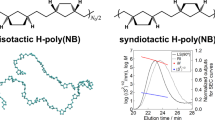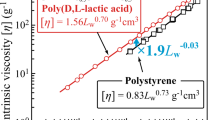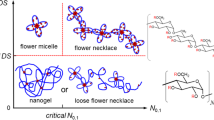Abstract
Porath and Flodin1 have shown that macromolecules in aqueous solutions may be separated from low molecular weight compounds by liquid chromatography using a cross-linked dextran (‘Sephadex’) as the stationary phase, and water as the mobile phase. It has now been found in these laboratories that polymers dissolved in mineral oil can be separated by a similar Chromatographic technique. Small pieces of thin vulcanized natural rubber latex are used as the stationary phase, and a light paraffin hydrocarbon as the mobile phase.
This is a preview of subscription content, access via your institution
Access options
Subscribe to this journal
Receive 51 print issues and online access
$199.00 per year
only $3.90 per issue
Buy this article
- Purchase on Springer Link
- Instant access to full article PDF
Prices may be subject to local taxes which are calculated during checkout
Similar content being viewed by others
References
Porath, J., and Flodin, P., Nature, 183, 1657 (1959).
Hill, M. W., and Munsell, M. W., Amer. Chem Soc., Div. Pet. Chem., 5 (3), 115 (1960).
Author information
Authors and Affiliations
Rights and permissions
About this article
Cite this article
BREWER, P. Liquid Chromatographic Separation of Mixtures of Polymers and Mineral Oil. Nature 188, 934–935 (1960). https://doi.org/10.1038/188934a0
Issue Date:
DOI: https://doi.org/10.1038/188934a0
This article is cited by
-
Über die Verwendung von anorganischen „Quasi-Matrizen-Gelen“ zur Fraktionierung in Hochpolymeren
Kolloid-Zeitschrift & Zeitschrift für Polymere (1967)
-
Liquid Chromatographic Separations using Rubber as the Stationary Phase
Nature (1961)
Comments
By submitting a comment you agree to abide by our Terms and Community Guidelines. If you find something abusive or that does not comply with our terms or guidelines please flag it as inappropriate.



